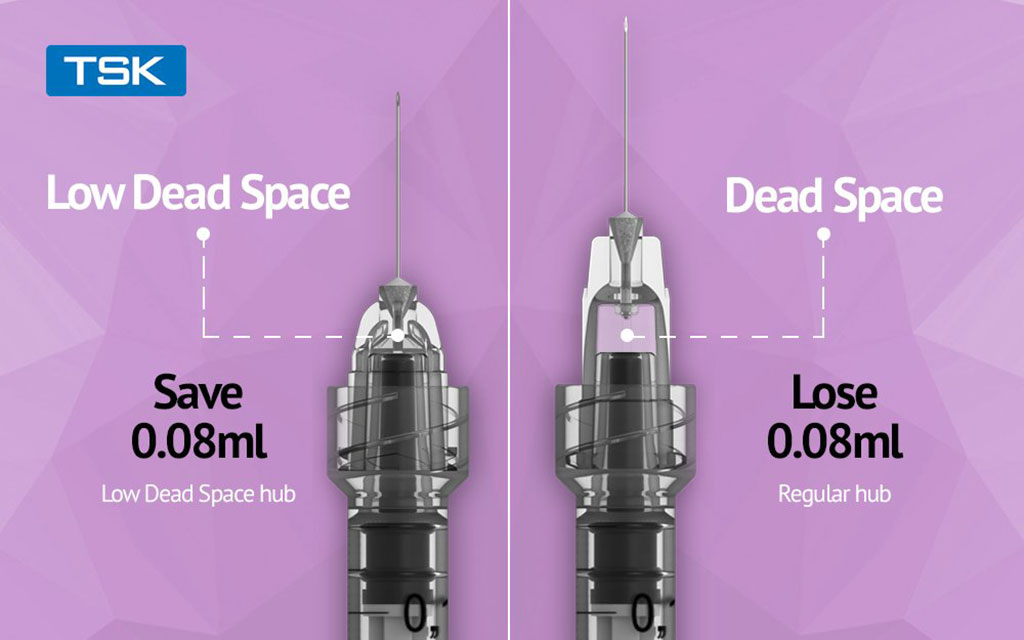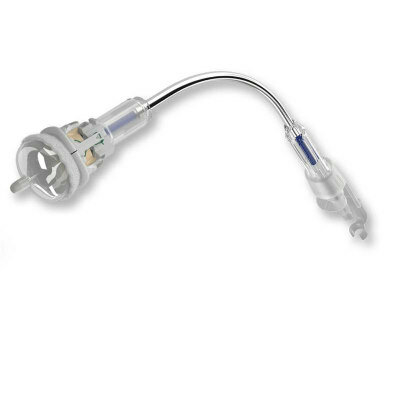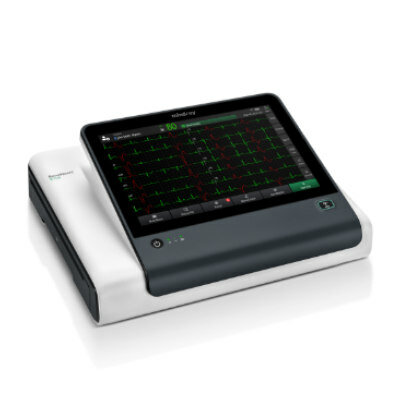Low Dead Space Needles Assist Mass Vaccination
|
By HospiMedica International staff writers Posted on 16 Dec 2020 |

Image: Low dead space needles can conserve vaccine use (Photo courtesy of TSK Laboratory)
A specially developed needle can potentially save a significant amount of a vial’s contents, which could help vaccinate millions more against COVID-19.
The TSK Laboratory (Vancouver, Canada) low dead space needle reduces average dead space to 14 microliters, compared to a conventional needle, which has an average dead space of about 45 microliters. A conservative estimate shows that using the dead space needle could lead to a savings of 20 microliters per dose, while an optimistic one suggests 40 microliters can be saved. This represents a 4-8 percent saving, on the assumption that a typical vaccine dose is 0.5 milliliters. And by keeping the dead space as low as possible, the full indicated vaccine dose can be given with each injection.
The use of the dead space needle means less vaccine wasted, costs reduced, and the right dose of the vaccine injected. For example, the European Union (EU) purchased 200 million doses of the COVID-19 vaccine from Pfizer (New York, NY, USA) and others to vaccinate 100 million citizens. This means that an additional four to eight million people in Europe could be vaccinated, compared to if a standard needle is used. The same benefit can be gained from the hundreds of around 700 vaccine candidates in development targeting the coronavirus disease (COVID-19).
“There is currently much talk about the development of a vaccine against COVID-19, but there is very little being said about how the vaccine will be injected when it becomes available. This is especially critical when it relates to mass vaccination programs,” said Doris de Beer, managing director of TSK Laboratory Europe. “The COVID-19 crisis is unprecedented in modern history and it affects everyone. We the people, governments and companies should work together in fighting this crisis.”
Vaccines, as most other injectable drugs, need to be packaged in sterile borosilicate glass vials that are impermeable to corrupting gases like oxygen, which even high-grade plastics cannot impede for more than a few minutes. In 2019, the global pharmaceutical industry purchased some 12 billion vials; COVID-19 vaccines, which most likely will have to be administered in two separate injections, will require many billions of additional vials.
Related Links:
TSK Laboratory
Pfizer
The TSK Laboratory (Vancouver, Canada) low dead space needle reduces average dead space to 14 microliters, compared to a conventional needle, which has an average dead space of about 45 microliters. A conservative estimate shows that using the dead space needle could lead to a savings of 20 microliters per dose, while an optimistic one suggests 40 microliters can be saved. This represents a 4-8 percent saving, on the assumption that a typical vaccine dose is 0.5 milliliters. And by keeping the dead space as low as possible, the full indicated vaccine dose can be given with each injection.
The use of the dead space needle means less vaccine wasted, costs reduced, and the right dose of the vaccine injected. For example, the European Union (EU) purchased 200 million doses of the COVID-19 vaccine from Pfizer (New York, NY, USA) and others to vaccinate 100 million citizens. This means that an additional four to eight million people in Europe could be vaccinated, compared to if a standard needle is used. The same benefit can be gained from the hundreds of around 700 vaccine candidates in development targeting the coronavirus disease (COVID-19).
“There is currently much talk about the development of a vaccine against COVID-19, but there is very little being said about how the vaccine will be injected when it becomes available. This is especially critical when it relates to mass vaccination programs,” said Doris de Beer, managing director of TSK Laboratory Europe. “The COVID-19 crisis is unprecedented in modern history and it affects everyone. We the people, governments and companies should work together in fighting this crisis.”
Vaccines, as most other injectable drugs, need to be packaged in sterile borosilicate glass vials that are impermeable to corrupting gases like oxygen, which even high-grade plastics cannot impede for more than a few minutes. In 2019, the global pharmaceutical industry purchased some 12 billion vials; COVID-19 vaccines, which most likely will have to be administered in two separate injections, will require many billions of additional vials.
Related Links:
TSK Laboratory
Pfizer
Latest Critical Care News
- Novel Cannula Delivery System Enables Targeted Delivery of Imaging Agents and Drugs
- Ingestible Smart Capsule for Chemical Sensing in the Gut Moves Closer to Market
- Novel Intrabronchial Method Delivers Cell Therapies in Critically Ill Patients on External Lung Support
- Generative AI Technology Detects Heart Disease Earlier Than Conventional Methods
- Wearable Technology Predicts Cardiovascular Risk by Continuously Monitoring Heart Rate Recovery
- Wearable Health Monitoring Device Measures Gases Emitted from and Absorbed by Skin
- Groundbreaking Technology Rapidly Detects Airborne Influenza Viruses
- Handheld Device Could Transform Heart Disease Screening
- Flexible Semi-Autonomous Robot Could Deliver Medicine Inside Body

- Neurorestorative Treatment Strategies Hold Promise for Most Severe Forms of Epilepsy
- Gene Discovery Could Help Grow New Heart Arteries
- Study Discovers Invisible Transmission of Common Hospital-Associated Infection
- Non-Invasive Neuro-Ophthalmology Techniques Could Detect Brain Tumors Earlier
- Mass Manufactured Nanoparticles to Deliver Cancer Drugs Directly to Tumors
- World’s Smallest Pacemaker Fits Inside Syringe Tip

- AI-Powered, Internet-Connected Medical Devices to Revolutionize Healthcare, Finds Study
Channels
Surgical Techniques
view channel
Pioneering Sutureless Coronary Bypass Technology to Eliminate Open-Chest Procedures
In patients with coronary artery disease, certain blood vessels may be narrowed or blocked, requiring a stent or a bypass (also known as diversion) to restore blood flow to the heart. Bypass surgeries... Read more
Intravascular Imaging for Guiding Stent Implantation Ensures Safer Stenting Procedures
Patients diagnosed with coronary artery disease, which is caused by plaque accumulation within the arteries leading to chest pain, shortness of breath, and potential heart attacks, frequently undergo percutaneous... Read more
World's First AI Surgical Guidance Platform Allows Surgeons to Measure Success in Real-Time
Surgeons have always faced challenges in measuring their progress toward surgical goals during procedures. Traditionally, obtaining measurements required stepping out of the sterile environment to perform... Read morePatient Care
view channel
Portable Biosensor Platform to Reduce Hospital-Acquired Infections
Approximately 4 million patients in the European Union acquire healthcare-associated infections (HAIs) or nosocomial infections each year, with around 37,000 deaths directly resulting from these infections,... Read moreFirst-Of-Its-Kind Portable Germicidal Light Technology Disinfects High-Touch Clinical Surfaces in Seconds
Reducing healthcare-acquired infections (HAIs) remains a pressing issue within global healthcare systems. In the United States alone, 1.7 million patients contract HAIs annually, leading to approximately... Read more
Surgical Capacity Optimization Solution Helps Hospitals Boost OR Utilization
An innovative solution has the capability to transform surgical capacity utilization by targeting the root cause of surgical block time inefficiencies. Fujitsu Limited’s (Tokyo, Japan) Surgical Capacity... Read more
Game-Changing Innovation in Surgical Instrument Sterilization Significantly Improves OR Throughput
A groundbreaking innovation enables hospitals to significantly improve instrument processing time and throughput in operating rooms (ORs) and sterile processing departments. Turbett Surgical, Inc.... Read moreHealth IT
view channel
Printable Molecule-Selective Nanoparticles Enable Mass Production of Wearable Biosensors
The future of medicine is likely to focus on the personalization of healthcare—understanding exactly what an individual requires and delivering the appropriate combination of nutrients, metabolites, and... Read more
Smartwatches Could Detect Congestive Heart Failure
Diagnosing congestive heart failure (CHF) typically requires expensive and time-consuming imaging techniques like echocardiography, also known as cardiac ultrasound. Previously, detecting CHF by analyzing... Read moreBusiness
view channel
Expanded Collaboration to Transform OR Technology Through AI and Automation
The expansion of an existing collaboration between three leading companies aims to develop artificial intelligence (AI)-driven solutions for smart operating rooms with sophisticated monitoring and automation.... Read more
















